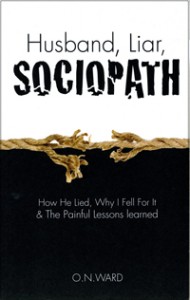By O.N. Ward
Every week, a chapter of my book, “Husband, Liar, Sociopath: How He Lied, Why I Fell For It & The Painful Lessons Learned” (available via Amazon.com, just click on the title or book cover) will be published here on Lovefraud. To read prior chapters, please see the links at the bottom of the post.
Chapter 18: Of Economics 101 And Frogs In Hot Water
You need not have studied economics to know that scarcity drives up value. A sip of water for someone parched in the desert is immensely more valuable than the same sip of water at the end of a meal at a white tablecloth restaurant where an attentive waiter refills your glass constantly. Is love any different? A single gesture of kindness or expression of love in a flowing stream of affection goes all but unnoticed. The value of that same gesture in a love-deprived environment, however, is immeasurable.
Because human beings value love, many of those who seek to control others use love or the promise of love to control and weaken others emotionally. Taking a chapter out of the “Sociopath’s Playbook,” Paul began by getting me to love and to trust him. Next, he exploited my trust as he changed my world from love-rich and positive to love-starved and negative. This gave him power over me, because it left him as the primary source of something I valued but rarely got—affection.
Why would any self-respecting, confident woman tolerate such behavior? At a basic level, I am no different from a frog, and sadly, neither are you. I have been told on many occasions, typically in business settings, that if a frog is put in hot water, the frog will jump immediately to safety (if it can). The frog’s mental arithmetic is pretty simple:
Hot Water > Ouch! > Jump! > Live!
However, if that same frog is placed in comfortable water and the heat is turned up ever so slowly, the frog will stay in the pot until it is boiled to death, because the life-threatening change is too gradual for the frog to detect. In the absence of the perception of danger, the frog’s self-preservation instincts do not kick in and tell it to jump to safety. In the frog’s brain, the situation probably looks something like this:
Nice Water > Warm > Warmer > A Bit Warmer >Hot > Really Hot > Boiling >
Dead Frog!
The moral of the frog story is that it is difficult to sense changes in the environment when the change is subtle but continual. However, it does not take long for small changes to accumulate, adding up to meaningful shifts and, ultimately, profound and possibly disastrous alterations in the environment. If a company fails to sense these changes, it cannot take the required actions. Even if the owner is aware of symptoms of poor health, such as declining profits, he or she may not understand the root cause behind them and, therefore, may not be able to make the required course corrections. Eventually, the business dies.
I am no expert on frogs, but if the frog is anything like me, it is possible that due to the gradual nature of the change, by the time the frog senses danger, it has been too weakened by the hot water to jump out. Alternatively, the frog may want to jump, but it is being cooked on a gas stove, and the frog is not sure that it can clear the flames as it tries to reach safety. Similarly, the most dangerous time for a woman trying to escape an abusive relationship is when she actually tries to leave. Hence, the question, “Why didn’t you just leave?” is insultingly ignorant. In either case, maybe the frog wants to get to safety but cannot. It needs help if it is going to survive. Someone must either turn off the stove or reach in and pull the frog out of the pot. If not, the frog knows it is weak and in danger but must resign itself to a terrible fate. This echoes the sense of helplessness many emotionally and/or physically battered women feel, and it is among the many reasons why it is so hard for them to leave abusive relationships. I understand it now, because, due to my relationship with Paul, I am one of those women.
To make matters worse, you can probably get the frog to jump willingly and happily into a pot of comfortable water if it is disguised to look exactly like the perfect frog habitat, complete with everything the frog needs for its long-term survival and well-being (food, a mate, shelter, nice temperature, and so on). Should the frog have known better than to pick a habitat that looked so perfect? Is the frog weak and pathetic to have stayed as the environment changed, even if there was no conscious perception of the changes until the frog was too weak to leave? Did the frog really choose to stay in such a toxic environment if it was unaware of the toxicity?
I pose these questions, because if, as you read my story, you dismiss me as pathetic or weak, then you make the assumption that what happened to me could never happen to you or someone you love (assuming you do not think you or your loved ones are weak and pathetic). But this would be a mistake. Just watch ten episodes of a crime show like Murder by the Book or 48 Hours. What percentage of the close family and friends of individuals who turned out not just to be sociopaths but sociopathic murderers thought the killer was anything other than a wonderful parent, child, sibling, or community leader?
Yes, it makes great drama to focus on “who done it” and “how they solved the crime,” but wouldn’t it do greater public service to unearth the warning signs? How could others have known, for example, that the head of the recreation committee, father of two, and little league coach turned out to be a sociopath who had grown tired of his wife and killed her simply to avoid the financial consequences and personal inconvenience of a divorce? Normal people do not do such things, but sociopaths do! What were the red flags? How could the people involved have known? What signs suggest we might be in a similar situation?
“My husband is considerate and caring. He simply couldn’t have murdered his third wife,” the fourth wife says on national television, standing by her man even when the evidence against her husband is overwhelming. “The man I know is simply not capable of such a thing.”
Yes, it makes for good television drama, but the problem with vouching for someone’s character is that it assumes what you know about a person in certain situations generalizes to all situations. This is not even a good assumption when it comes to nonsociopaths, but it is a terrible assumption when it comes to sociopaths. It is the same as assuming that just because Meryl Streep persuasively portrayed an emotionally tormented World War II concentration camp survivor in Sophie’s Choice that she could never convincingly play British Prime Minister Margaret Thatcher in The Iron Lady. She won an Oscar for both roles. Like Meryl Streep, Sociopaths are accomplished actors, but the real world is their stage. Sociopaths are that good at masking who they are and playing whatever role is required to get what they want, including a long-term marriage to provide a warm, cozy home base and the illusion of normalcy.
TV stories about sociopaths make such compelling drama, because virtually no one suspects ahead of time what these individuals really are. The doting fourth wife, for example, truly loves her husband and sincerely believes he could never have murdered anyone. But if experts are right, that between one and four percent of humans are sociopaths, then our only defense against falling into a sociopath’s trap is to understand the prevalence of sociopaths in our everyday lives, to be wary of the subtle signs, and to understand what aspects of our humanity they are using against us.
Start from the beginning:
Go to previous chapter:
Go to the next chapter:
Notes
Identifying names, places, events, characteristics, etc. that I discuss here and in my book have been altered to protect the identity of everyone involved.





































 When we stop wishing the past were different, we can recover from destructive relationships
When we stop wishing the past were different, we can recover from destructive relationships
Sunnygal
A terrific chapter.
Sunnygal
So well written.
Sunnygal
Thank you O.N.
Sunnygal
This is so true.
goodoldgal
I agree!
Sunnygal
Very dangerous.
Sunnygal
this is right on.
Sunnygal
An accurate description.
Sunnygal
very good description.
Sunnygal
Excellent description of what can happen.
Sunnygal
Thank you O.N. Ward